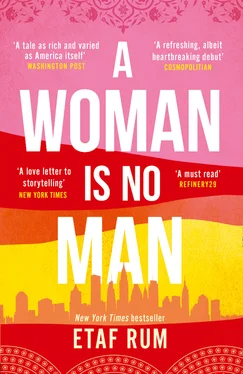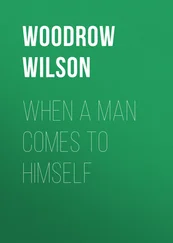“What makes you say that?”
“You know.” She met his eyes. “Because you’re a man.”
Nasser looked at her curiously. “Is that what you think? That I can do anything I want because I’m a man?”
“That’s the world we live in.”
He leaned forward, resting his hands on the table. It was the closest Deya had ever sat to a man, and she leaned back in her seat, pressing her hands between her thighs.
“You’re strange,” Nasser said.
She could feel her face flush, and she looked away. “Don’t let my grandmother hear you say that.”
“Why not? I meant it as a compliment.”
“She won’t see it that way.”
There was a pause, and Nasser reached for his teacup. “So,” he said after taking a sip. “How do you imagine your life in the future?”
“What do you mean?”
“What do you want, Deya Ra’ad?”
She couldn’t help but laugh. As if it mattered what she wanted. As if it were up to her. If it were up to her, she’d postpone marriage for another decade. She’d enroll in a study-abroad program, pick up and move to Europe, perhaps Oxford, spending her days in cafés and libraries with a book in one hand and a pen in the other. She’d be a writer, helping people understand the world through stories. But it wasn’t up to her. Her grandparents had forbidden her to attend college before marriage, and she didn’t want to ruin her reputation in the community by defying them. Or worse, be disowned, banned from seeing her sisters, the only home and family she had ever known. She was already abandoned and alone in so many ways; to lose her remaining roots would be too much to bear. She was afraid of the life her grandparents had planned for her, but even more afraid of the unknown. So she tucked her dreams away, did as she was told.
“I just want to be happy,” she told Nasser. “That’s all.”
“Well, that’s simple enough.”
“Is it?” She met his eyes. “If so, then why haven’t I seen it?”
“I’m sure you have. Your grandparents must be happy.”
Deya tried to keep from rolling her eyes. “Teta spends her days complaining about her life, how her children abandoned her, and Seedo barely comes home. Trust me. They’re miserable.”
Nasser shook his head. “Maybe you’re judging them too harshly.”
“Why? Are your parents happy?”
“Of course they are.”
“Do they love each other?”
“Of course they love each other! They’ve been married for over thirty years.”
“That doesn’t mean anything,” Deya scoffed. “My grandparents have been married for over fifty years, and they can’t stand the sight of each other.”
Nasser said nothing. From the expression on his face, Deya knew he found her pessimism unpleasant. But what should she have said to him instead? Should she have lied? It was already enough she was forced to live a life she didn’t want to live. Should she really begin a marriage with lies? When would it end?
Eventually Nasser cleared his throat. “You know,” he said. “Just because you can’t see the happiness in your grandparents’ life, that doesn’t mean they’re not happy. What makes one person happy doesn’t always work for someone else. Take my mother—she values family over everything. As long as she has my father and her children, she’s happy. But not everyone needs family, of course. Some people need money, others need companionship. Everyone is different.”
“And what do you need?” Deya asked.
“What?”
“What do you need to be happy?”
Nasser bit the inside of his lip. “Financial security.”
“Money?”
“No, not money.” He paused. “I want to have a stable career and live comfortably, maybe even retire young.”
She rolled her eyes. “Work, money, same thing.”
“Maybe so,” he said, blushing. “Why, what’s your answer?”
“Nothing.”
“That’s not fair. You have to answer the question. What would make you happy?”
“Nothing. Nothing would make me happy.”
He blinked at her. “What do you mean, nothing? Surely something must make you happy.”
She turned to look out the window, feeling his eyes follow her face. “I don’t believe in happiness.”
“That’s not true. Maybe you just haven’t found it yet.”
“It is true.”
“Is it because—” He stopped. “Do you think it’s because of your parents?”
She could tell he was trying to meet her eyes, but she kept them fixed on the window. “No,” she lied. “Not because of them.”
“Then why don’t you believe in happiness?”
He would never understand, even if she tried to explain. She turned to face him. “I just don’t believe in it, that’s all.”
He looked back at her with a glum expression. She wondered what he saw, whether he knew that if he opened her up, he would find, right behind her ribs, only a fist of rot and mud.
“I don’t think you really mean that,” he eventually said, smiling at her. “You know what I think?”
“What?”
“I think you’re just pretending to see how I’d react. You wanted to see if I’d make a run for it.”
“Interesting theory.”
“I think it’s true. In fact, I bet you do it often.”
“Do what?”
“Push people away so they won’t hurt you.” She looked away. “It’s okay. You don’t have to admit it.”
“There’s nothing to admit.”
“Fine. But can I tell you something?” She turned back toward him. “I won’t hurt you. I promise.”
She forced a smile, wishing she could trust him. But she didn’t think she knew how.
Fareeda hurried into the kitchen as soon as Nasser left, her almond brown eyes wide and questioning: Did Deya like him? Did she think he’d liked her? Would she agree to the marriage proposal? Deya had said no to a few proposals, her answer ripe on the tip of her tongue. But mostly the suitor was first to withdraw his offer. On these occasions, after the parents had politely informed them that a match had not been made and Fareeda had cried and slapped her face, her grandmother had only become more persistent. A few phone calls, and she had found a new suitor by the end of the week.
But this time was different. “Looks like you didn’t scare this one away,” Fareeda said with a grin from the kitchen doorway. She was wearing the red-and-gold dress she wore when suitors visited, with a cream scarf draped loosely around her head. She moved closer. “His parents said they’d like to visit again soon. What do you think? Did you like Nasser? Should I tell them yes?”
“I don’t know,” Deya said, shoving a wet rag across the kitchen table. “I need some time to think about it.”
“Think about it? What’s there to think about? You should be thankful you even have a choice in the matter. Some girls aren’t that lucky— I certainly never was.”
“This isn’t a choice,” Deya mumbled.
“Why, of course it is!” Fareeda ran her fingers against the kitchen table to make sure it was clean. “My parents never asked me if I wanted to marry your grandfather. They just told me what to do, and I did it.”
“Well, I don’t have parents,” Deya said. “Or uncles or aunts, or anyone besides my sisters for that matter!”
“Nonsense. You have us,” Fareeda said, though she didn’t meet her eyes.
Deya’s grandparents had raised Deya and her three sisters since she was seven years old. For years it had just been the six of them, not the large extended family that was the norm in Arab households. Growing up, Deya had often felt the sting of loneliness, but it stung the most on Eid celebrations, when she and her sisters would sit at home, knowing there was no one coming to visit them on the most important holiday. Her classmates would boast about the festivities they attended, the family members who gave them gifts and money, while Deya smiled, pretending that she and her sisters did those things, too. That they had uncles and aunts and people who loved them. That they had a family. But they didn’t know what it meant to have a family. All they had were grandparents who raised them out of obligation, and each other.
Читать дальше












